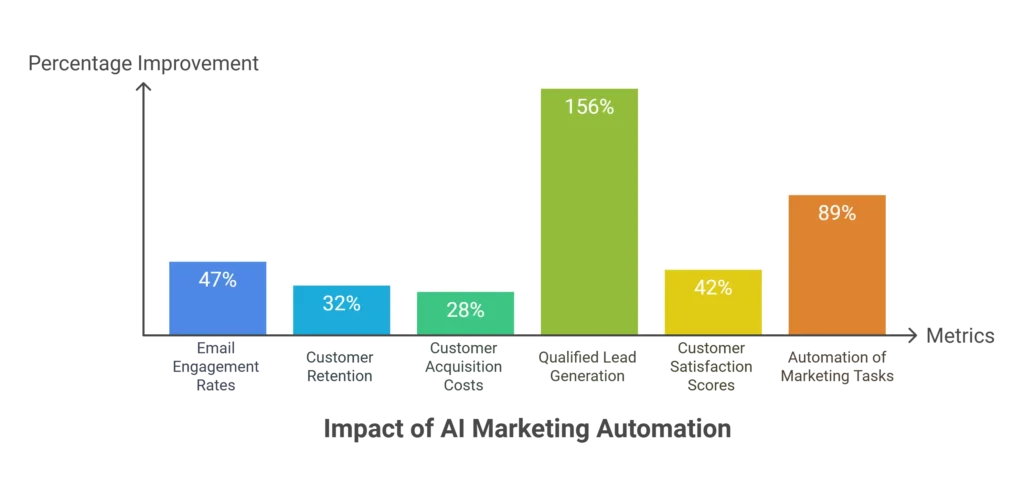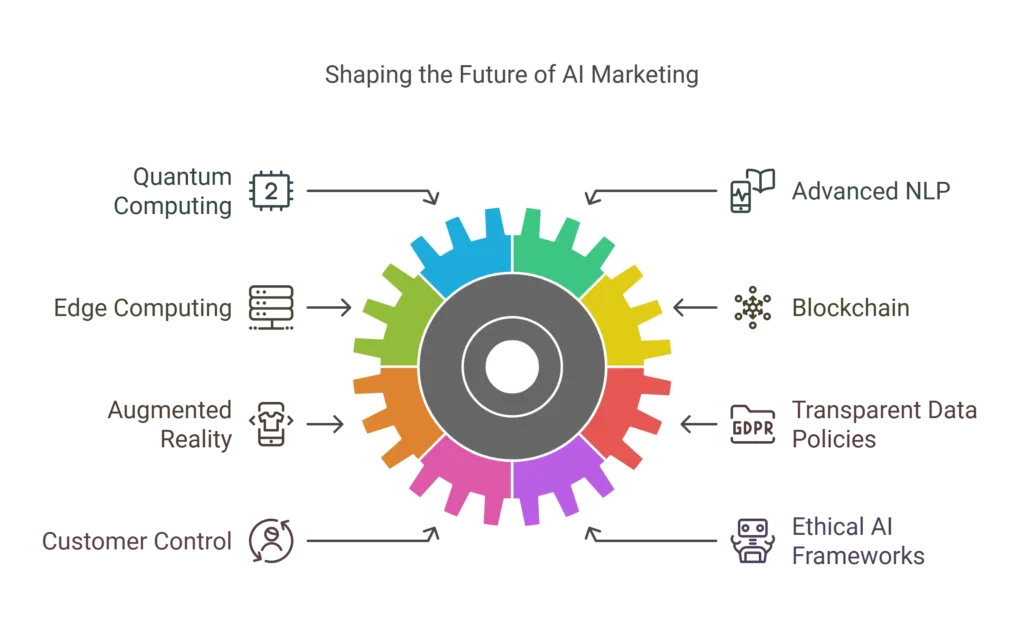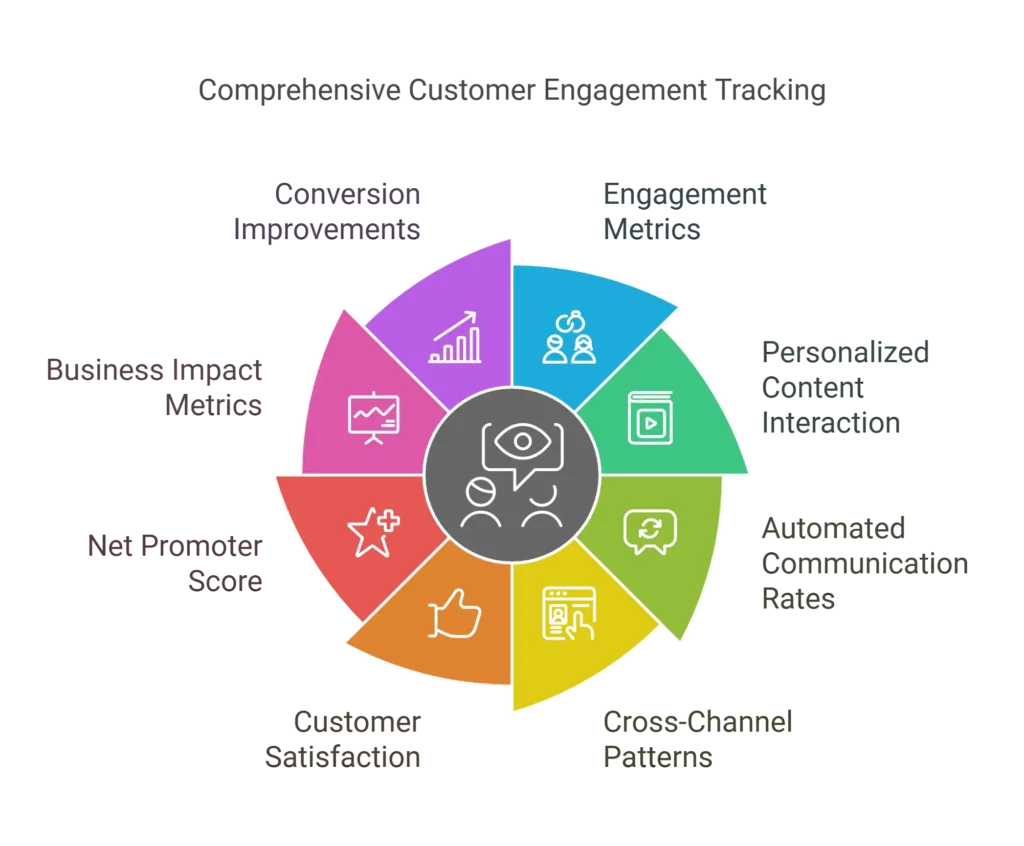How AI marketing automation is revolutionizing personalized customer experiences in 2025
According to a comprehensive market analysis by GlobeNewswire, the global AI marketing automation market is projected to reach $220.1 billion by 2030, growing at an unprecedented CAGR of 26.7%. This explosive growth underscores a fundamental shift in how businesses approach customer engagement and personalization.
Are you prepared to leverage AI marketing automation to create the hyper-personalized experiences your customers expect in 2025? The gap between companies that embrace AI-driven personalization and those that don’t is widening rapidly, with AI adopters reporting 2.3x higher customer lifetime value.
Key Takeaways:
- Revolutionizing Marketing: AI marketing automation enables hyper-personalized customer experiences, improving engagement, retention, and ROI.
- Explosive Market Growth: The AI marketing automation market is projected to reach $220.1 billion by 2030, with a CAGR of 26.7%.
- Core Technologies: Predictive analytics, real-time personalization engines, and advanced AI models are transforming marketing strategies.
- Strategic Implementation: A phased approach, from data audits to technology integration, ensures smooth adoption and measurable results.
- Real-World Success: Businesses leveraging AI see 2.3x higher customer lifetime value and significant cost savings.
- Emerging Trends: Innovations like quantum computing, NLP, and blockchain are reshaping AI-powered marketing.
- Ethical AI Practices: Compliance with privacy regulations and ethical frameworks is essential for building customer trust.
- Roadmap to Success: Begin with foundational data setup, scale through pilot programs, and optimize with performance analytics.
- Challenges and Solutions: Overcome data quality issues and skill gaps by investing in robust infrastructure and team training.
- Future-Ready Strategies: Stay competitive by adopting AI tools for dynamic personalization and smarter customer insights.
The Evolution of Marketing Automation in 2025
The marketing landscape has undergone a dramatic transformation. According to recent research from the OECD, organizations implementing AI-driven marketing automation are seeing unprecedented levels of customer engagement and satisfaction. Traditional automation tools that simply scheduled emails or posted social media content have given way to sophisticated AI systems that understand, predict, and adapt to individual customer behaviors in real-time.
Market Adoption and Growth
Recent data from Eurostat reveals that 8% of EU enterprises with ten or more employees are now utilizing AI technologies, with leading countries like Denmark and Finland showing adoption rates above 15%. This trend indicates a growing recognition of AI’s crucial role in modern marketing strategies.
Key Components of AI Marketing Automation

Predictive Analytics and Customer Intelligence
According to research published in the Journal of Electrical Systems, modern AI marketing platforms have demonstrated a 30% increase in customer engagement and a 25% rise in sales revenue through advanced machine learning algorithms that analyze:
- Cross-channel behavioral patterns and purchasing histories
- Social media interactions and sentiment analysis
- Customer service interactions and feedback
- Website navigation patterns and content preferences
- Purchase frequency and value metrics
Real-Time Personalization Engines
A study by Deloitte highlights how AI-powered personalization engines are revolutionizing customer experiences through:
- Dynamic content adaptation based on real-time user behavior
- Predictive product recommendations
- Personalized pricing strategies
- Automated customer journey optimization
- Context-aware messaging and timing
Implementation Strategy for 2025

Assessment and Planning
The Marketing AI Institute recommends a structured approach to implementation:
- Comprehensive data audit and quality assessment
- Clear objective setting and KPI definition
- Technical infrastructure evaluation
- Phased implementation planning
- Team capability assessment and training needs analysis
Technology Selection and Integration
Research from Emerald Insight suggests considering these key factors:
- Scalability and performance capabilities
- Integration requirements and compatibility
- Data security and privacy compliance
- Machine learning model customization options
- Support and maintenance requirements
Real-World Success Stories

Enterprise Implementation: Global Retail Giant
According to a case study published by the International Journal of Scientific Research, a major retail corporation achieved remarkable results:
- 47% increase in email engagement rates
- 32% improvement in customer retention
- $138 million in additional revenue
- 28% reduction in customer acquisition costs
Mid-Market Success: Regional Service Provider
Research from MDPI documents how a medium-sized professional services firm leveraged AI marketing automation to:
- Reduce customer acquisition costs by 28%
- Increase qualified lead generation by 156%
- Improve customer satisfaction scores by 42 points
- Achieve 89% automation of routine marketing tasks
Future Trends and Innovations

Stay ahead in marketing by using AI tools for better personalization and smarter strategies in 2025!
Emerging Technologies
The USPTO’s AI Patent Dataset reveals several key innovations shaping the future of AI marketing automation:
- Quantum computing applications in customer behavior prediction
- Advanced NLP for automated content personalization
- Edge computing integration for real-time processing
- Blockchain-based privacy solutions
- Augmented reality marketing experiences
Privacy and Ethics Considerations
The OECD’s AI Policy Observatory emphasizes the importance of:
- Transparent data collection and usage policies
- Customer control over personalization preferences
- Ethical AI frameworks for marketing automation
- Compliance with evolving privacy regulations
- Regular auditing of AI systems for bias
Implementation Roadmap

Execute your marketing plans seamlessly with HubSpot’s AI tools. Support your implementation journey from start to finish.
Phase 1: Foundation Building (Months 1-3)
Based on Influencer Marketing Hub’s research:
- Data infrastructure assessment and enhancement
- Team training and skill development
- Initial AI platform selection and testing
- Privacy compliance framework establishment
- Baseline metrics documentation
Phase 2: Launch and Optimization (Months 4-6)
- Pilot program implementation
- Performance monitoring and adjustment
- Scaling successful initiatives
- Integration with existing marketing stack
- Customer feedback collection and analysis
Measuring Success

Key Performance Indicators
Statista’s global marketing research recommends tracking:
- Customer Engagement Metrics
- Time spent on personalized content
- Interaction rates with automated communications
- Cross-channel engagement patterns
- Customer satisfaction scores
- Net Promoter Score (NPS)
- Business Impact Metrics
- Conversion rate improvements
- Customer lifetime value changes
- Return on marketing investment
- Cost per acquisition
- Revenue attribution to AI initiatives
Technical Implementation Considerations

Implement AI seamlessly with DigitalOcean’s solutions. Empower your technical team to deploy effective AI models.
Data Architecture
According to Taylor & Francis Online, successful AI marketing automation requires:
- Robust data collection infrastructure
- Real-time processing capabilities
- Secure data storage solutions
- Integration with existing systems
- Scalable architecture design
AI Model Selection and Training
- Custom vs. pre-trained models
- Continuous learning capabilities
- Model performance monitoring
- Bias detection and mitigation
- Regular model retraining schedules
Conclusion
AI marketing automation is no longer optional for businesses aiming to deliver exceptional customer experiences in 2025. As Salesforce’s research indicates, organizations that embrace AI-driven personalization are seeing significantly higher customer engagement rates and ROI compared to those using traditional marketing approaches.
To succeed in this new era, organizations must:
- Embrace data-driven decision making
- Invest in the right technology stack
- Maintain a balance between personalization and privacy
- Continuously optimize and adapt their approach
- Foster a culture of innovation and experimentation
The future of personalized marketing is here, and it’s powered by artificial intelligence. According to Insight7’s analysis, organizations that delay adoption risk falling significantly behind their competitors in customer engagement and market share.
Start your AI marketing automation journey today. Schedule a strategic assessment to identify your organization’s personalization opportunities and create a roadmap for success in 2025 and beyond.
Unlock more insights by exploring our complete guide on AI Marketing Automation for 2025
FAQ
What is AI marketing automation and why is it important for personalized customer experiences?
Brief Answer: AI marketing automation refers to the use of artificial intelligence technologies to automate marketing tasks, enabling businesses to deliver personalized customer experiences efficiently.
Detailed Explanation: AI marketing automation leverages algorithms to analyze customer data and behavior, allowing businesses to tailor marketing messages and campaigns to individual preferences. Companies that excel at personalization can achieve up to 40% more revenue than their competitors. Additionally, 71% of customers now expect personalized interactions from brands, highlighting the growing demand for such technologies in enhancing customer engagement.
Source: Snov.io (Published: December 27, 2024)
How prevalent is the use of AI in marketing as of 2025?
Brief Answer: As of 2025, approximately 85% of B2B marketers report using generative AI in their strategies, reflecting a significant increase in adoption rates.
Detailed Explanation: A survey indicated that 76% of these marketers are satisfied with the results generated by AI tools, showcasing their effectiveness in improving marketing outcomes. The integration of AI into daily workflows has also risen, with about 36% of marketers reporting its use for automating customer interactions and generating content. This widespread adoption underscores the transformative impact of AI on marketing practices.
Source: Influencer Marketing Hub (Published: October 2, 2024)
What are the emerging trends in AI marketing automation for 2025?
Brief Answer: Key trends include hyper-personalization, machine learning advancements, and the increasing use of natural language processing (NLP).
Detailed Explanation: The push for hyper-personalization is driven by consumer expectations for tailored experiences. Machine learning enables businesses to predict customer behavior and optimize content delivery based on individual preferences. Furthermore, NLP applications are enhancing customer interactions through chatbots and automated responses, significantly improving service efficiency. These trends indicate a shift towards more intelligent and responsive marketing strategies.
Source: Bannerflow (Published: October 30, 2024)
What challenges do marketers face when implementing AI marketing automation?
Brief Answer: Major challenges include data quality issues, lack of expertise, and integration difficulties.
Detailed Explanation: A survey revealed that 52% of marketers struggle with collecting quality data necessary for effective personalization. Additionally, nearly half report feeling limited by a lack of expertise in utilizing these advanced tools. Integration issues with existing systems also pose significant barriers, as 70% of organizations encounter technical challenges when implementing AI solutions. Addressing these challenges is crucial for maximizing the benefits of AI marketing automation.
Source: Productive Shop (Published: October 20, 2023)
What is the projected market growth for AI in marketing by 2030?
Brief Answer: The global market for AI in marketing is projected to grow from $41.9 billion in 2023 to approximately $220.1 billion by 2030.
Detailed Explanation: This growth reflects a compound annual growth rate (CAGR) of around 25%, driven by increasing investments in AI technologies across various sectors. The ability of AI to enhance personalization and improve operational efficiency is key to this expansion. Companies are expected to continue prioritizing AI-driven strategies as they seek to gain competitive advantages in their marketing efforts.
Source: Grand View Research (Published: October 1, 2024)
How can businesses ensure compliance with regulations when using AI in marketing?
Brief Answer: Businesses can ensure compliance by staying informed about relevant regulations and implementing ethical guidelines for data usage.
Detailed Explanation: As regulatory landscapes evolve, particularly concerning data privacy and consumer rights, companies must adapt their practices accordingly. Regular audits of data collection methods and transparency in how customer information is used are essential steps. Furthermore, engaging with legal experts can help navigate complex regulations while leveraging AI technologies effectively.
Source: Upperscore (Published: Date not specified)
What actionable insights can be derived from current trends in AI marketing automation?
Brief Answer: Businesses should focus on enhancing data quality, investing in employee training on AI tools, and prioritizing customer-centric strategies.
Detailed Explanation: To capitalize on the benefits of AI marketing automation, organizations need to ensure high-quality data collection processes are in place. Additionally, providing training resources for employees will empower them to utilize these technologies effectively. Lastly, adopting a customer-centric approach that emphasizes personalization will likely yield higher engagement and conversion rates.
Source: Scoop Market (Published: May 31, 2024)
Dive deeper into how AI streamlines marketing processes, and stay ahead of the curve with the latest marketing automation adoption rates!




